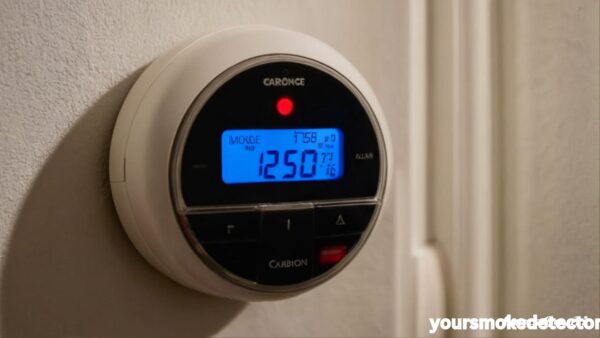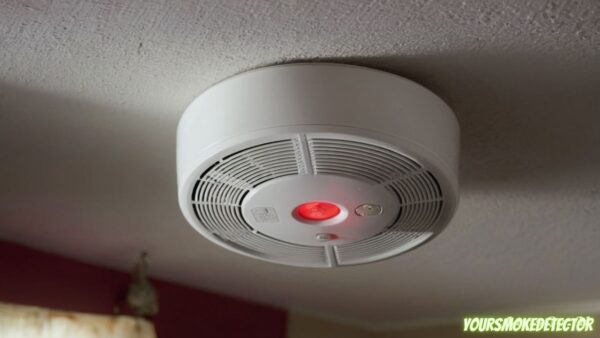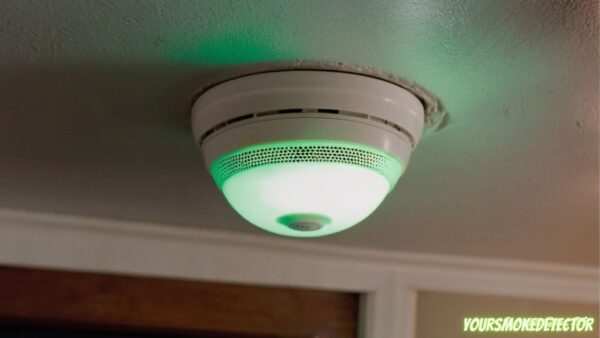Welcome to our informational blog.
Dear visitors if your carbon monoxide alarm sounded then stop.
So Don’t worry about this common issue with carbon monoxide alarms.
In this guide, we explain 7 common reasons for this problem with a unique solution.
The Carbon Monoxide Alarm Sounded Then Stopped

1. Low Battery Power
Cause
Carbon Monoxide (CO) alarms require a sufficient power source to function accurately.
A low battery can lead to intermittent chirping or a single alarm sound, confusing it with a real CO detection.
This happens because the battery power gets too low to effectively power the alarm’s regular operations.
Solution
The remedy for a low battery power issue is straightforward – replace the batteries.
It’s recommended to use new, high-quality alkaline batteries to ensure the optimal functioning of your CO alarm.
Regularly checking your alarm and scheduling battery replacements can also prevent unexpected low-battery warnings.

2. Expiration of the Alarm Unit
Cause
Carbon monoxide alarms have a finite lifespan, typically between 5 to 7 years.
If your alarm sounds brief and then stops, it may signal that the unit has reached its end of life.
This is a safety feature designed to prevent the risk of false security from a failing unit. It’s crucial to understand that a silent alarm doesn’t always indicate a faultless device.
Solution
Once a carbon monoxide alarm expires, the best course of action is to replace the unit. Never ignore an expiring alarm; it’s a matter of life and death.
Remember to check the manufacturer’s guidelines for the recommended lifespan of your specific model.
To ensure continuous protection, set reminders to check your alarms periodically and replace them as suggested by the manufacturer.
3. Temperature Fluctuations
Cause
Extreme temperature fluctuations can trigger false alarms in carbon monoxide detectors.
These devices are designed to operate within a certain temperature range, typically between 40°F and 100°F.
If the temperature swings beyond this range, it can cause the alarm to sound briefly and then stop.
Solution
To avoid this issue, ensure the carbon monoxide detector is installed in a location where it isn’t exposed to significant temperature changes.
Avoid areas near heating or cooling vents, windows, or exterior doors.
If temperature fluctuations continue to trigger the alarm, it may be time to consider replacing the device with one designed to handle a wider temperature range.
4. Alarm Sensor Failures
Cause
The primary cause for carbon monoxide alarm sensor failure generally stems from its lifespan limitation.
Specifically, most sensors are designed to last for only 5 to 7 years. Upon reaching this age, the sensor’s efficiency in detecting carbon monoxide diminishes, leading to potential false alarms or unresponsiveness.
An over-exposure to carbon monoxide or lack of regular maintenance may also accelerate the sensor’s degradation.
Solution
The most straightforward solution to a failing sensor is its replacement.
Once the device reaches its end of life, it’s crucial to install a new carbon monoxide detector to ensure ongoing safety.
Regular maintenance, including cleaning and battery replacement, can also prolong the sensor’s lifespan and optimize its performance.
5. Electrical Power Surges
Cause
Power surges can cause a carbon monoxide alarm to sound off and then stop.
This is typically due to sudden increases in voltage from the power source, which can interfere with the alarm’s normal operation.
These surges can be due to lightning strikes, power outages, or heavy electrical appliance usage.
Solution
The best solution to protect your carbon monoxide alarm from power surges is by using surge protectors.
These devices safeguard your alarm by regulating the voltage supplied to it, preventing any damage or malfunctions caused by power surges.
Regular inspection of your home’s electrical system can also help identify and rectify potential sources of power surges.
6. Erroneous Alarm Triggers
Cause
The cause of an erroneous alarm in a Carbon Monoxide (CO) detector can be due to various reasons, including low battery power, the presence of other gases or chemicals, or even high humidity levels.
Sometimes, these alarms may also be triggered due to the age of the device, with most CO detectors having a lifespan of 5-7 years.
Solution
The solution to an erroneous CO alarm includes checking the battery and replacing it if needed, ensuring the detector is located away from sources of other gases or chemicals, and maintaining a moderate level of humidity in your home.
It is of utmost importance to replace the detector unit every 5-7 years to ensure its effectiveness and prevent false alarms.
7. Alarm Malfunctions due to Dust or Dirt Accumulation
Cause
Carbon Monoxide (CO) alarms are sensitive devices designed to detect and alert homeowners to potentially dangerous levels of CO.
Dust or dirt accumulation on the sensors can cause the alarm to malfunction, either by triggering false alarms or by preventing the alarm from sounding when it should.
Solution
Regular maintenance of your CO alarm is essential to avoid this issue. This includes frequent cleaning to remove dust or dirt from the sensors.
Using a can of compressed air can effectively remove accumulated particles without damaging the device.
Always remember to follow the manufacturer’s instructions for additional specific maintenance guidelines.
Conclusion
A carbon monoxide alarm sounding and then stopping could indicate a number of scenarios. It could mean that the levels of carbon monoxide (CO) briefly spiked but then dropped, possibly due to proper ventilation.
Alternatively, it could be a sign that the alarm is malfunctioning or the batteries need replacing.
As CO is a dangerous gas that is both odorless and colorless, it’s crucial to investigate any alarm activity promptly.
Regular maintenance of the alarm unit is also vital to ensure its optimal function. In case of consistent alarms, evacuating the premises and seeking professional help is recommended to ensure personal safety.
FAQs
Why did my CO2 alarm go off and then stop?
This could happen for several reasons. The alarm may have detected a brief surge in CO2 levels that quickly dissipated, causing the alarm to stop.
Alternatively, it could be due to a low battery, malfunctions, or the end of the unit’s life expectancy.
Is it bad if my carbon monoxide alarm goes off?
Yes, it could be a potentially dangerous situation. Carbon Monoxide (CO) is a colorless, odorless gas that can be lethal in high concentrations.
If your CO alarm is sounding, it is crucial to evacuate the premises immediately and call for professional help.
What is the life of a carbon monoxide alarm?
On average, a carbon monoxide alarm has a lifespan of approximately 5-7 years.
However, this can vary based on the brand, model, and how well the device is maintained. Always refer to the manufacturer’s instructions for specific details.
Carbon Monoxide Alarm Sounded Then Stopped
Carbon Monoxide Detector Beeping Every 30 Seconds
Carbon Monoxide Detector Green Light Stays On
Smoke Detector Blinking Red No Sound
First Alert Smoke Detector Green Light Blinking
Blinking Red Light on Smoke Detector
Fire Alarm Randomly Going Off for a Few Seconds
Hard Wired Smoke Detector Red Light Flashing
Hardwired Smoke Alarm Keeps Going Off at Night
How to Silence Smoke Alarm Low Battery
Mains Smoke Alarm Beeping Every 30 Seconds
Why Did My Fire Alarm Randomly Go Off in the Middle of the Night
Carbon Monoxide Detector Beeps 4 Times Then Stopped
Why Did My Smoke Detector Beep 3 Times and Stop



